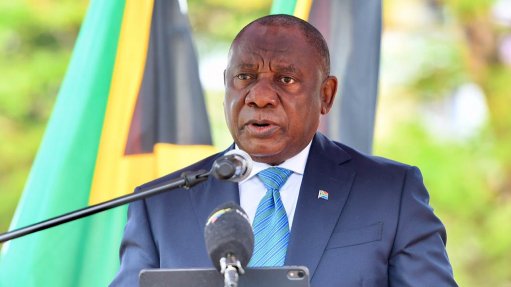
President Cyril Ramaphosa
The carbon intensity of our economy has become unsustainable, President Cyril Ramaphosa writes in his latest weekly newsletter, published ahead of his address to a climate finance symposium being hosted jointly by the National Treasury and the Presidential Climate Commission.
Ramaphosa notes that the world is moving towards greener economies and that a number of South Africa’s major trading partners are also taking measures to decarbonise that will affect the competitiveness of the country’s exports to these markets.
He made no direct reference to the Carbon Border Adjustment Mechanism (CBAM) that the European Union (EU) plans to begin implementing from 2026 onwards, nor similar plans to prevent “carbon leakage” in the UK, the US, Japan and Canada.
However, South Africa’s cement, iron and steel and aluminium sectors are particularly exposed to CBAM, with initial research indicating that the sectors could experience export declines of between 16% and 30% by 2030.
This exposure is largely related to the coal-intensity of South Africa’s electricity sector, which raises Scope 3 emissions for electricity-intensive manufacturers to extreme levels.
South Africa is moving diplomatically to oppose the implementation of CBAM by the EU and others, arguing that such a unilateral intervention ran contrary to the multilateralism required to tackle climate change.
Such measures would also prove onerous for an economy such as South Africa, which was already experiencing premature deindustrialisation, while further weakening its financial position to implement strategies to mitigate carbon emissions and adapt to the effects of climate change.
This includes those strategies being pursued under the Just Energy Transition Partnership with several of the countries pursuing or considering CBAM measures.
In his letter, Ramaphosa also highlights that the effects of climate change are worsening in South Africa.
He points, in particular, to the 2022 KwaZulu-Natal floods, which led to the deaths of more than 300 people and which caused damage to social and economic infrastructure, as well as other severe storms and floods, and recent heatwaves.
However, he also moved to underline the economic toll, particularly for sectors such as agriculture, tourism, mining and manufacturing, as well as the threats posed to water security, food security, public infrastructure, human settlements, health care and education.
“The increasing frequency of extreme weather events is a stark reminder that we have to accelerate the pace of our efforts.
“We need to use our fiscal policy – how we manage public finances – to support our response to the shocks of climate change and to advance the just transition to a more inclusive, resilient and sustainable economy.”